Art therapy is a powerful tool for supporting neurodiverse individuals. For people with autism, ADHD, dyslexia, and other neurological abilities, art therapy offers unique ways to explore emotions, develop skills, and foster connection. By using creative expression, neurodiverse clients can work through challenges in a supportive, empowering environment. Here are three key benefits of art therapy for neurodiverse clients.
- Enhances Communication Skills
For neurodiverse individuals who may find it challenging to express themselves verbally, art therapy offers an alternative outlet. The creative process allows clients to convey feelings and experiences visually, bypassing the need for words. Through drawing, painting, or sculpting, they can share thoughts and emotions in a safe environment. This non-verbal communication can be particularly helpful for individuals on the autism spectrum, supporting them in building self-confidence and emotional awareness.
- Reduces Anxiety and Sensory Overload
Art therapy is also a valuable tool for managing anxiety and sensory sensitivities. Neurodiverse clients often have heightened sensory experiences, which can lead to feelings of overwhelm. Art therapy provides a calming, structured activity that clients can engage with at their own pace. The repetitive motions of certain art forms, like coloring or clay modeling, can be grounding and soothing, helping clients feel more in control. This can improve their overall well-being and become a useful coping strategy.
- Supports Social Engagement and Emotional Connection
For some neurodiverse clients, building social connections and understanding emotions can be challenging. Group art therapy sessions foster social interaction in a low-pressure setting where clients can practice communication. By participating in collaborative projects or sharing their artwork, clients learn to interpret emotions—both their own and others’. This skill-building can translate to other areas of life, helping clients form deeper connections in their communities.
Join our mailing list for more information like this.
